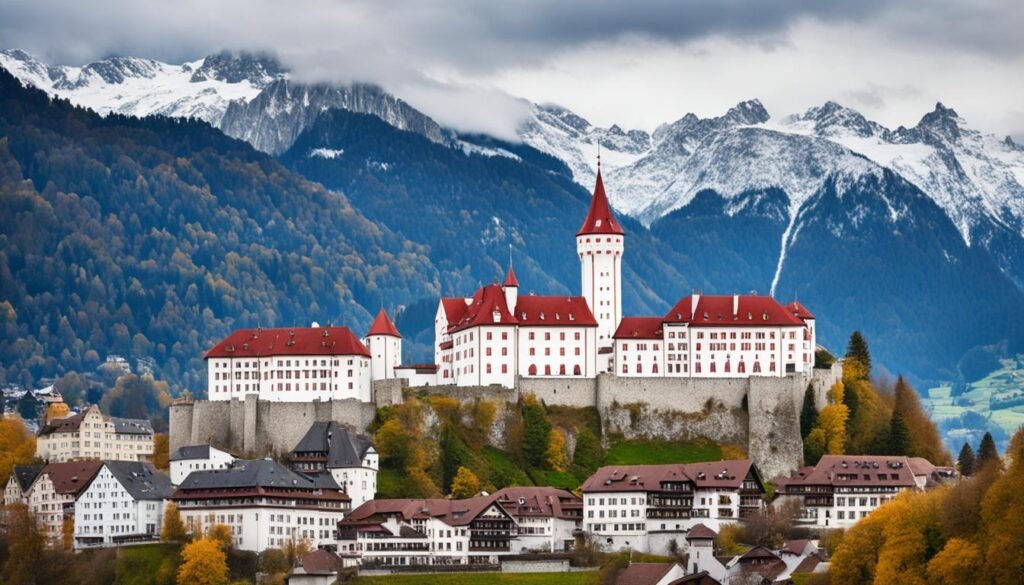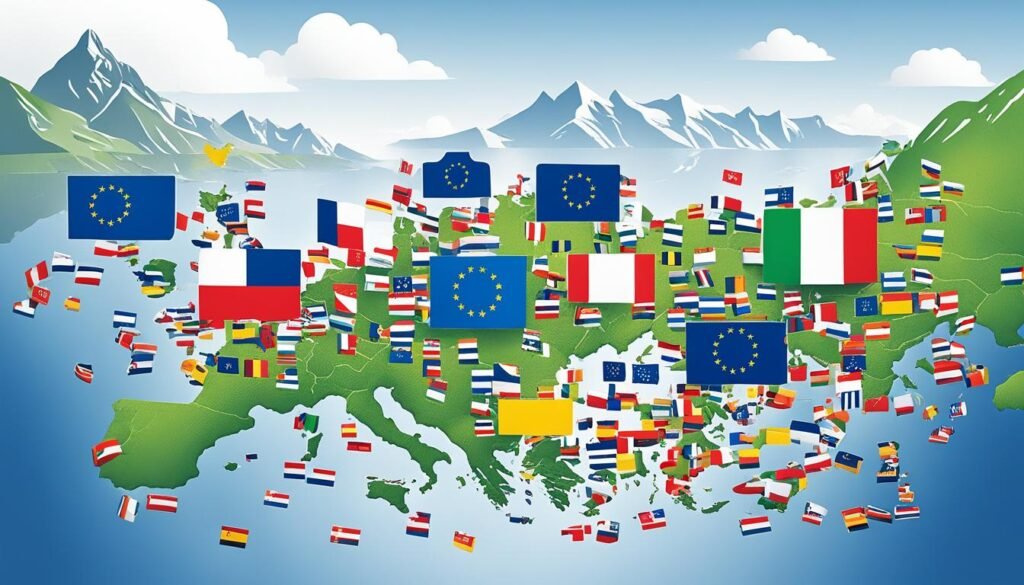Just 160 square kilometers in size, the tiny principality of Liechtenstein boasts an economy that punches far above its weight. With a GDP per capita of over $165,000, this Alpine nation ranks among the world’s wealthiest countries, rivaling the economic might of much larger nations. Liechtenstein’s success is a testament to its free-market policies, low taxation, and thriving financial services sector, which have transformed this once-sleepy microstate into a global economic powerhouse.
Key Takeaways
- Liechtenstein is a prosperous, highly industrialized, free-enterprise economy with a vibrant private sector and minimal state involvement.
- The country’s low tax rates and thriving financial services industry have made it a global financial center and a popular tax haven.
- Liechtenstein’s unique political structure, as a constitutional monarchy with elements of direct democracy, has contributed to its economic success.
- The principality’s strategic location between Austria and Switzerland has also been a key factor in its economic development.
- Liechtenstein’s small size and limited natural resources have necessitated a focus on high-value-added industries and services, driving its prosperity.
Introduction to Liechtenstein: A Microstate with Majestic Alps
Nestled between Switzerland and Austria, the Alpine principality of Liechtenstein is a captivating microstate that defies its diminutive size. As the fourth-smallest state in Europe and the sixth-smallest country in the world, Liechtenstein boasts a rich history, breathtaking geography, and a unique political and economic structure.
Background and Geography
With an area of just over 160 square kilometers, Liechtenstein is a doubly landlocked principality, meaning it is surrounded by other landlocked countries. Its landscape is characterized by the majestic Alps, which cover a significant portion of the country’s terrain. Liechtenstein’s population, as of 2023, stands at around 40,023 people, making it one of the least populated countries in the world.
Political and Economic Structure
Liechtenstein is a semi-constitutional monarchy with a direct democracy. The country is headed by the Prince of Liechtenstein, who belongs to the House of Liechtenstein, a noble European family. The principality’s unique political structure, combined with its thriving economy, has made it a prosperous and influential microstate on the global stage.
Liechtenstein: At the Heart of the Alps
Nestled in the heart of the European Alps, the small principality of Liechtenstein boasts a breathtaking alpine landscape that captivates visitors from around the world. With its majestic mountains, pristine valleys, and pristine glacial lakes, this landlocked microstate offers a stunning glimpse into the geographic wonders of the Alps.

The country’s geography is defined by its mountainous terrain, which covers over 80% of its total area. The Rhaetian Alps, part of the larger Retezat-Godeanu mountain range, dominate the landscape, with peaks reaching over 2,500 meters in height. These alpine ridges and valleys create a diverse array of microclimates, supporting a rich tapestry of flora and fauna unique to the region.
Liechtenstein’s alpine climate, with its distinct seasons, also plays a crucial role in shaping the country’s economic and cultural identity. The long, snowy winters attract winter sports enthusiasts to the country’s well-developed ski resorts, while the milder summers offer ample opportunities for hiking, climbing, and other outdoor pursuits in the pristine natural settings.
Whether you’re drawn to the majestic summits, the picturesque valleys, or the quaint alpine villages, Liechtenstein’s geography and landscape are undoubtedly a defining feature of this small but captivating European nation.
A Prosperous and Industrialized Free-Enterprise Economy
Liechtenstein boasts a highly prosperous and industrialized economy built on the principles of free-enterprise. The country’s key economic sectors include a robust manufacturing industry, a thriving financial services sector, and a burgeoning high-tech industry. This dynamic economy has made Liechtenstein a hub for businesses and entrepreneurs seeking a favorable business environment.
Key Economic Sectors and Industries
Liechtenstein’s manufacturing sector is a driving force behind its economic success, producing a diverse range of products from precision instruments to machinery and textiles. The country’s financial services industry is equally important, with Liechtenstein’s low taxation rates and banking secrecy laws attracting a significant number of individuals and businesses seeking tax-friendly havens.
Low Taxation and Financial Services
Liechtenstein’s commitment to low taxation has been a significant factor in its economic prosperity. The country’s tax-friendly environment, combined with its robust financial services industry, has made it a popular destination for global businesses and high-net-worth individuals seeking to maximize their financial returns. This unique combination of factors has solidified Liechtenstein’s position as a thriving free-enterprise economy.
Governance: A Constitutional Monarchy with Direct Democracy
Liechtenstein’s unique system of governance combines the traditions of a constitutional monarchy with the principles of a direct democracy. At the helm of this remarkable microstate is the Princely House of Liechtenstein, currently led by Prince Hans-Adam II. The Prince holds significant political power, including the ability to dismiss the government, nominate judges, and veto legislation.
Despite this strong monarchical influence, Liechtenstein also embraces the tenets of direct democracy. The country’s citizens actively participate in the decision-making process, with regular referendums on important issues. This blend of monarchy and direct democracy has endured for decades, contributing to the nation’s political stability and economic prosperity.
The Princely House of Liechtenstein
The House of Liechtenstein, a centuries-old noble family, has long been the ruling dynasty of the Principality of Liechtenstein. The current Prince, Hans-Adam II, has served as the head of state since 1989, guiding the country’s governance and maintaining its unique position as a constitutional monarchy with a strong democratic tradition.

The Princely House’s influence extends beyond the realm of politics, as it also plays a significant role in the country’s cultural and economic spheres. The family’s vast art collection and investments in various industries have contributed to Liechtenstein’s overall prosperity and global reputation.
Liechtenstein: Microstate Economics Vaduz Liechtenstein
Despite its small size, Liechtenstein has developed a unique economic model that has made it a global financial center. As a microstate economy, Liechtenstein has leveraged its political stability, low taxation, and skilled workforce to attract businesses and high-net-worth individuals from around the world.
Liechtenstein’s Unique Economic Model
Liechtenstein’s economic success is built on a strong focus on financial services, industrial manufacturing, and a favorable tax environment. The country’s political stability, sound regulatory framework, and commitment to economic openness have made it an attractive destination for global businesses and investors. Liechtenstein’s economic model emphasizes the importance of niche markets, innovation, and high value-added industries.
The Role of Vaduz in the Microstate’s Economy
Vaduz, the capital and largest city of Liechtenstein, plays a central role in the country’s economy. As a financial center, Vaduz is home to numerous banks, asset management firms, and other financial institutions that cater to a global clientele. The city’s well-developed infrastructure, skilled workforce, and business-friendly policies have made it a hub for international companies seeking a stable and prosperous base of operations in the heart of Europe.
A Global Business and Financial Center
Liechtenstein has firmly established itself as a global hub for business and finance. The country’s strategic location in the heart of Europe, coupled with its attractive tax policies and stable political environment, have made it a prime destination for companies and high-net-worth individuals seeking a secure and prosperous financial center.
With its low corporate tax rates and banking secrecy laws, Liechtenstein has become a popular choice for financial services, including banking, wealth management, and corporate structuring. This has attracted a significant number of multinational corporations and affluent individuals, who have been drawn to the country’s business-friendly policies and robust financial infrastructure.

The Principality’s strategic position within the European Economic Area (EEA) further enhances its appeal as a global business and financial center. Liechtenstein’s membership in the EEA grants companies access to the vast European market, while maintaining the country’s independent economic and regulatory framework.
Vaduz, the capital and financial hub of Liechtenstein, is home to a thriving banking and wealth management industry. The city’s reputation for financial stability, discretion, and innovation has made it a sought-after destination for those seeking to safeguard their assets and grow their wealth in a secure and business-friendly environment.
Education and Research: Fostering Innovation
Liechtenstein has a strong focus on education and research, with several universities and institutions offering opportunities for study and innovation. The University of Liechtenstein is a premier institution providing programs in areas such as architecture, business, and engineering. Additionally, the Liechtenstein Institute conducts cutting-edge research and analysis on a wide range of topics related to the country.
Nurturing a Culture of Innovation
Liechtenstein’s commitment to education and research goes beyond its academic institutions. The country actively fosters a culture of innovation, encouraging collaboration between universities, research centers, and the private sector. This synergy drives the development of new technologies, products, and services, positioning Liechtenstein as a hub for innovation in the region.
With its focus on cultivating a skilled workforce and supporting cutting-edge research, Liechtenstein continues to position itself as a leader in education and innovation, contributing to the country’s overall economic prosperity and global competitiveness.
Culture and Traditions of the Alpine Principality
Liechtenstein, nestled in the heart of the Alps, boasts a rich cultural heritage that is deeply rooted in its alpine surroundings. The country’s traditional cuisine reflects the bounty of its mountainous landscape, with signature dishes like “Ribel,” a savory cornmeal or wheat semolina-based delicacy, and “Käsknöpfle,” a delectable pasta covered in melted cheese.
Cider, wine, and beer also play a significant role in Liechtenstein’s cultural landscape, with local producers crafting exceptional beverages that complement the region’s alpine cuisine. Beyond the palate, the Principality’s culture is further defined by its vibrant community life, where clubs and organizations serve as hubs for social interaction and the preservation of time-honored traditions.
Liechtenstein’s deep connection to its alpine roots is evident in the everyday lives of its citizens, who embrace the region’s natural beauty and celebrate its rich cultural heritage. From the picturesque villages nestled among the towering peaks to the lively festivals that bring the community together, the Principality’s culture and traditions are a testament to the resilience and resilience of its people.
Tourism: Exploring the Natural Beauty of Liechtenstein
Liechtenstein, a picturesque microstate nestled in the heart of the Alps, is a true gem for outdoor enthusiasts and nature lovers. With its majestic mountains, serene valleys, and well-preserved natural environment, the country has become a popular tourist destination, offering a wealth of activities and experiences for visitors to explore.
Winter Sports and Outdoor Activities
Liechtenstein is renowned for its thriving winter sports industry, boasting a range of ski resorts that cater to skiers and snowboarders of all skill levels. From the challenging slopes of the Malbun ski area to the family-friendly Steg ski resort, the country provides ample opportunities for visitors to enjoy the exhilarating winter wonderland.
But Liechtenstein’s natural beauty is not limited to the winter season. Throughout the year, the country’s extensive network of hiking trails and cycling routes allows visitors to immerse themselves in the stunning alpine scenery. Adventurous travelers can embark on challenging mountaineering expeditions, while those seeking a more leisurely pace can opt for scenic walks through the picturesque valleys and meadows.
Whether you’re seeking to conquer the peaks or simply soak in the breathtaking vistas, Liechtenstein’s natural wonders offer a truly remarkable experience for nature enthusiasts and outdoor adventurers alike.
International Relations and Memberships
Liechtenstein, the small Alpine principality, has carved out a unique position for itself on the global stage. As a member of the United Nations, the European Free Trade Association, and the Council of Europe, the country has forged strong international relations and strategic partnerships. While not a member of the European Union, Liechtenstein’s participation in the Schengen Area and the European Economic Area allows it to benefit from the free movement of goods, services, capital, and people within the EU single market.
Liechtenstein’s Role in the European Economic Area
Liechtenstein’s economic ties with its neighbors have been a driving force in shaping its international memberships and relations. By actively participating in the European Economic Area, Liechtenstein has secured access to the vast EU market, fostering trade, investment, and economic growth. This strategic alignment has enabled the microstate to thrive and maintain its status as a prosperous, industrialized, and globally connected economy.

Liechtenstein’s membership in international organizations and its close economic integration with the European Union have strengthened its global influence and position. This unique relationship allows the principality to navigate the complexities of international relations while preserving its sovereignty and distinct national identity.
Conclusion: Liechtenstein’s Unique Position in the Global Economy
Liechtenstein’s position as a small, prosperous microstate has allowed it to develop a distinct economic model that emphasizes low taxation, financial services, and industrial manufacturing. The country’s strategic location in the heart of the European Alps, coupled with its political stability and favorable business environment, have positioned it as a global business and financial center.
Liechtenstein’s blend of traditional alpine culture, education and research, and international memberships contribute to its unique role in the global economy. The principality’s commitment to innovation and its embrace of technology have further solidified its status as a hub for cutting-edge industries and financial services.
As a microstate, Liechtenstein has navigated the challenges of scale with remarkable success, leveraging its agility and specialization to thrive in an increasingly interconnected world. The country’s unwavering focus on maintaining a stable, business-friendly environment has attracted global enterprises and investors, cementing its position as a vital player in the global economic landscape.
Source Links
- Liechtenstein: Introduction – https://globaledge.msu.edu/countries/liechtenstein
- Liechtenstein – https://en.wikipedia.org/wiki/Liechtenstein
- Liechtenstein at a glance – https://tourismus.li/en/our-country/about-liechtenstein/liechtenstein-at-a-glance/


